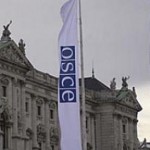 We are shocked by the statements made today by the Head of the OSCE Mission to Montenegro, Paraschiva Badescu, on the occasion of International Right to Know Day. These statements testify to her elementary lack of information about the activities of the civil society sector in Montenegro and to her lack of understanding for the very theory behind the concept of free access to information. Her statements represent yet another in a long list of abuses of the OSCE’s mandate that serve to conceal the government’s systematic shortcomings in carrying out reforms.
We are shocked by the statements made today by the Head of the OSCE Mission to Montenegro, Paraschiva Badescu, on the occasion of International Right to Know Day. These statements testify to her elementary lack of information about the activities of the civil society sector in Montenegro and to her lack of understanding for the very theory behind the concept of free access to information. Her statements represent yet another in a long list of abuses of the OSCE’s mandate that serve to conceal the government’s systematic shortcomings in carrying out reforms.
The OSCE ambassador stated that requests for information “need to be justified,” thus directly contradicting the very principles by which this right has been codified not only in Montenegrin law, but also in the laws of all democratic states (including in Ms. Badescu’s native Romania). The laws that deal with these questions, including the Council of Europe’s recently adopted Convention on Access to Official Documents, guarantee the right of access to information to all citizens without placing any additional requirements on them to justify their interests. This theoretical concept is premised on the fact that since citizens pay taxes and thereby finance the state, they have the right to know how their money is being spent and how governments are implementing reforms.
It’s a fact that Ms. Badescu did not even attempt to inform herself about MANS’ activities – an organization whose experience is used by other NGOs in the region, and even in some EU states – before deciding to make comments suggesting she does not understand what the purpose of so many information requests by NGOs could be and implying that the citizens of Montenegro themselves are not using these rights.
First off all, it should be noted that MANS offers legal assistance to a citizenry that wouldn’t dare to directly address state institutions in submitting access to information requests. Ms. Budescu should know that the citizens of Montenegro have a well founded fear of repression and of reprisals by the system if they are seen to be asking any ‘inconvenient’ questions. Secondly, Badescu could have at least gathered from the latest European Commission progress report that our requests are directly related to tracking how the money of Montenegro’s taxpayers is being spent and in monitoring how reforms in the fight against corruption and organized crime are being implemented.
 The Head of the OSCE Mission to Montenegro claims that the only problem is the lack the capacity on the part of state institutions to implement the Law on Free Access to Information. Yet, the OSCE itself and the Montenegrin Human Resources Management Authority have been training those working for the executive power for the past three years precisely in this field. Almost every state institution has assigned specialized officers for handling requests for information, while these employees receive salaries paid from the budget of Montenegro’s citizens.
The Head of the OSCE Mission to Montenegro claims that the only problem is the lack the capacity on the part of state institutions to implement the Law on Free Access to Information. Yet, the OSCE itself and the Montenegrin Human Resources Management Authority have been training those working for the executive power for the past three years precisely in this field. Almost every state institution has assigned specialized officers for handling requests for information, while these employees receive salaries paid from the budget of Montenegro’s citizens.
However, her evident lack of information about such basic facts unfortunately has not prevent Ms. Badescu from expressing such inaccurate and baseless assertions (in direct contravention of the OSCE’s own mandate to strongly support the implementation of this law). On the other hand, such statements from Ms. Badescu are directly in line with the positions of some individuals currently representing government institutions. In order to justify attempts to conceal information, these representatives are forwarding conspiracy theories that label NGOs as ‘spies’ and ‘foreign hirelings’ who for unknown reasons seem to insist on abusing the state by lodging freedom of information requests.
Hence, one might get the impression that the only purpose of Ms. Badescu’s statements is to conceal the essence of the problem, which is the obvious lack of political will to implement the Law on Free Access to Information; thereby preventing the citizenry from realizing their right to know how decisions are being made in their name and how much these decisions are costing them.
Vanja Ćalović, Executive Director



